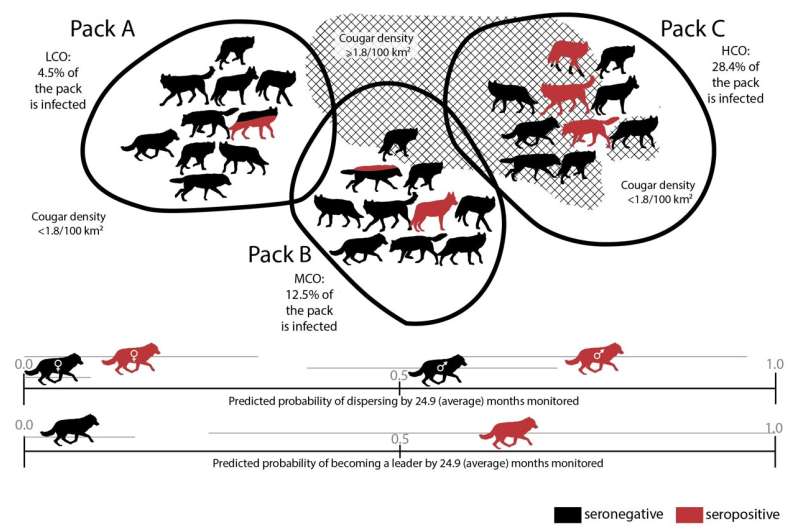November 25, 2022 report
Wolves infected with a common parasite may be much more likely to become pack leaders (Update)

A team of researchers with the Yellowstone Wolf Project at the Yellowstone Center for Resources, in Yellowstone National Park, in Wyoming, has found that wolves in the park who become infected with Toxoplasma gondii, a common parasite, are much more likely to become leaders of their pack. In their study, reported in the journal Communications Biology, the group analyzed data from studies of the wolves in the park over a 26-year period.
T. gondii is the parasitic protozoan responsible for causing toxoplasmosis. While the parasite requires felid hosts (such as cougars) to sexually reproduce, it's capable of infecting a wide range of warm-blooded animals, including humans. Prior research has shown that in most cases of infection, symptoms are few, though there is some evidence that suggests that they can lead to an increase in erratic or aggressive behavior.
In this new effort, the researchers wondered what sort of impact of T. gondii infections might have on wild wolves. To find out, they conducted an extensive study of wolves living in Yellowstone National Park.
The work involved studying data from blood samples taken from over 200 wolves living in the park over the years 1995–2020, while looking for evidence of infection. The researchers also looked at the notes made by research observers to learn more about any behavior changes that might have been evident in the wolves.
The researchers found that young, infected wolves tended to leave their packs earlier than those uninfected. Infected males were 50% more likely to leave their pack as early as six months after birth. Males normally stay for up to 21 months. And infected females were 25% more likely to leave their pack at 30 months, rather than the normal 48.
The researchers also found that infected males were more than 46 times more likely to become pack leaders than uninfected males. The researchers also found that infection rates were higher in wolves that mingled with cougars. The researchers suggest the differences in behavior were likely due to the impact of the parasite on the brains of wolves, making them bolder and less likely to back down when challenged by others.
More information: Connor J. Meyer et al, Parasitic infection increases risk-taking in a social, intermediate host carnivore, Communications Biology (2022). DOI: 10.1038/s42003-022-04122-0
Journal information: Communications Biology
© 2022 Science X Network




















